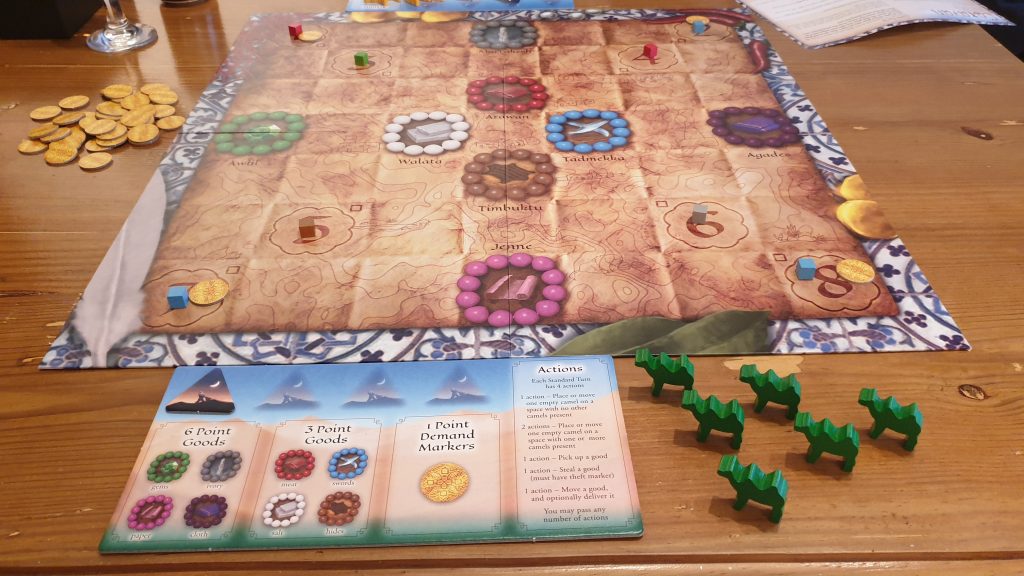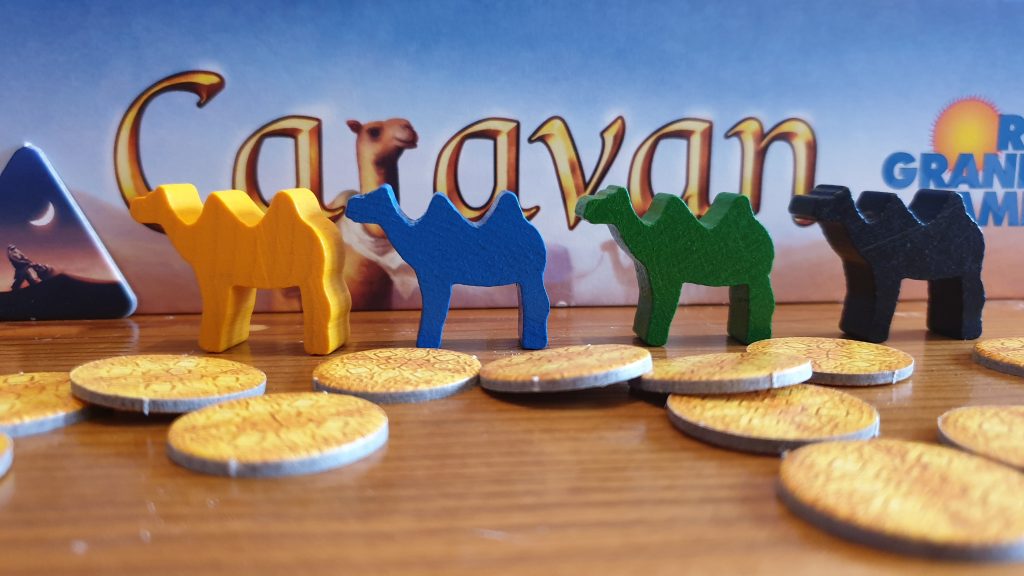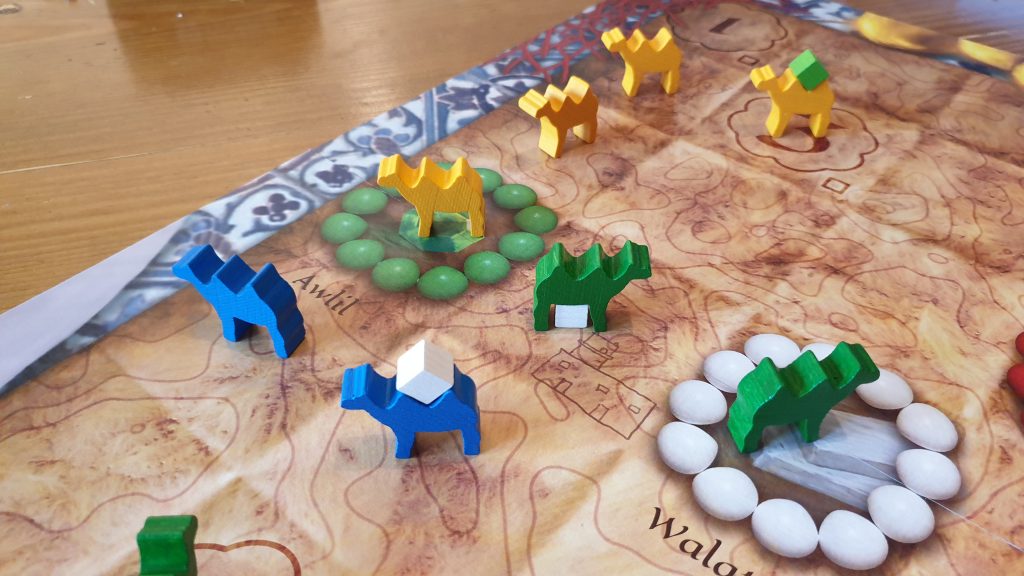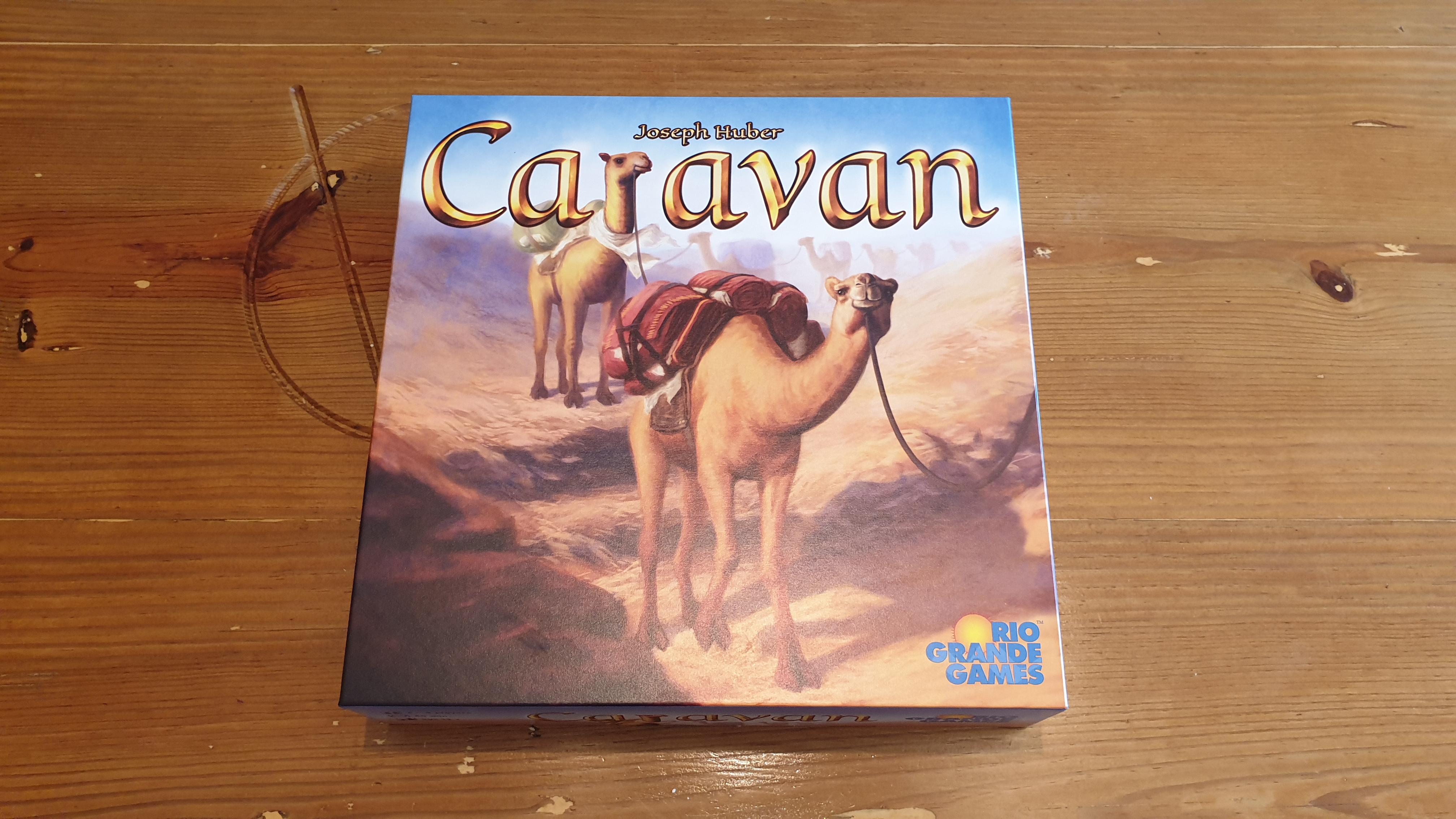Caravan is the brand new pick up and deliver board game from Rio Grande Games. Designed by Joe Huber, featuring art from Martin Hoffmann, the game sees 2 – 4 players transported to Western Africa in the 1300s for around 40 minutes. Throughout the game players will load up caravans of camels to transport goods, from ivory to meat, across the desert sands. However, is this an enjoyable title or one that’ll give you the hump? Let’s find out!
Everyone is a camel owning trader, looking to deliver goods of various rarity to locations. Each player will gain 5 camels (6 if you want an easier game), a player board of matching colour and a theft token. The central board has goods placed randomly from a bag onto set locations, 1 good per location, and demand markers are also added to 4 of these locations. To balance the starting order the first player gets 1 action point, the second player gets 2 and so on until 4 action points are reached. For the rest of the game everyone then gets 4 action points to spend.
Not all actions are equal, with some costing more than 1 action point or an additional token. For one action point a player may place or move one of their unladen camels onto any empty space. For the same cost, a player could instead claim a good cube from a space they have an unladen camel in – placing the cube on the camel to represent this. Taking this action where a demand marker sees the token claimed; it being kept on your personal board for scoring at the end of the game. Unlike many other games where meeples – albeit not normally camel shaped meeples – are placed the spaces aren’t blocked. Costing 2 action points an unladen camel may move onto an already occupied space.

Note, there is no way of moving a laden (carrying a good) camel. For an action point it is possible to move a good cube along a chain, or caravan, of orthogonal (not diagonal) camels. A good can moves along as many of your camels as you wish when you take this action. This is how players will be delivering goods, by chaining between the good and the location of the same colour. Delivered goods are kept, scoring you points at the end of the game, with common and uncommon goods worth different amounts.
The final action is to steal. To do this one of your unladen camels must be on the same space as an opponent’s laden camel. For 1 action point and a theft token you can take the resource on top of their camel and place it underneath your unladen camel. This is done to represent it cannot be stolen, at least until it is moved along a caravan. Note, a camel with a good below it or on top of it is treated as laden – so follows the normal rules. The theft token that was spent is not returned to the box. Instead it is passed to the player whom has been stolen from. Without a theft token this action cannot be taken – so you are effectively giving the other player the ability to steal on a turn by taking from them.
The game continues clockwise around the table with players taking four actions each turn. Once only four of the goods remain on the board, not counting the cubes on camels, it is time to restock. Each good still unclaimed gets a demand token – regardless of if it has one already – and the empty numbered good locations each get a cube added randomly from the bag. This occurs instantly, the game is paused to do this restock, so can happen mid turn.
The game ends as soon as a delivery is made after the final four goods are added to the board. At this point players will calculate their points. The four rarer goods are worth 6 points each, with the common goods worth 3 points each and demand tokens worth 1 point. Points are then lost depending on the number of goods a player has left undelivered on their camels. At this point, whomever has the most points wins, with ties split by the amount of demand tokens collected.

Screaming abstract and instantly breaking any immersion the title could have created is the movement and placement of the camels. With the ability to place or move an unladen camel anywhere it sees camels popping up throughout the game. It isn’t as if this is just the initial placing. It would add a chunk of time to the game but the teleporting camels is not intuitive and neither is their inability to move – even for a large amount of action points – when carrying a good. I have nothing against an abstract game drawing on a theme but this feels more pasted on due to these glaring oddities.
The stealing mechanic is ideal for curbing what could be a highly aggressive take that element of the game into a tactical choice. Starting the game with only one theft token the only way to get another is to have something stolen from you. This also means a single player won’t ever be constantly targeted. A targeted player’s theft tokens would pile up and they can then decide whether to hold on to them to stop future stealing or dish out the theft themselves. The game could have been more liberal giving say 2 theft tokens to each player though. It occurs perhaps too rarely to be a threat – with occupying spaces to force opponents to waste action points feeling just as rewarding.
Caravan is all about using the small range of actions in different ways at the right time to deliver the goods. The number of actions and what the various options cost are not instantly intuitive. Thankfully, it isn’t long into the first game when you’ll have taken the actions enough to remember them all. On top of this to aid players in the first game or two every action – and the cost – is listed on the personal player boards.
The rulebook is short and sweet, being just 2 pages long. Whilst everything is explained well, with the general gameplay having nothing hard to grasp, it would have been nice to have more imagery. A few pictures are there for explaining the way camels must link to be in a caravan but a shot of things such as the game once setup is always helpful when visualising the game. It isn’t a huge problem but it seems like the choice was made to keep the rules visually short rather than visually helpful.

There is something oddly special about the cube laden camel meeples. Perfectly using double humped camels the coloured good cubes balance mid humps and capture the visuals of camels laden with goods. They are simple but effective, though personally I’d of preferred plainer – realistic – camel shades rather than the colour popping palette used. This choice of colours does however make it very easy to know whom owns which camel. Alas, any readability of the board gained is negated by the fact that there are resources in different shades of the camel colours.
Issues with the production choices don’t end there though. Firstly, there is no reason for the delivery points to be named making it look more themeless as they have just arbitrarily got names under them. Secondly, the brown cubes, which represent animal hides, blend in with the sandy colours of the board. They can get forgotten about and ignored – a much bigger issue as it can see players restocking the board only to find out there were still 5 cubes on the board still.
This directly impacts another pain point – game admin. There is a lot of stopping and starting due to the restocking sections of the game. It disrupts the flow of individual turns by interrupting them, let alone the general gameplay. This also introduces a portion of luck. Picking up a blue cube with a route already made to the blue location could trigger more cubes being put out. Then, a new blue cube could find itself at your camel’s feet. It is a rare occurrence with 8 different resource types but it did actually win me one game – feeling unearnt as a result.
Caravan feels like it is channeling content from an older generation of German style board games. It is certainly an abstract style pick up and deliver title, and the high potential laden camel caravan theming is lost in the mechanisms. The board can be hard to read at times and the amount of game admin gets in the way of the flow of the gameplay. If you’re looking for a camel placement game check out Reiner Knizia’s Through The Desert. If you’re still interested just play the game before you purchase, it certainly looks like it would play better than it unfortunately does.
[Editor’s Note: Caravan was provided to us by Asmodee for review purposes. The game is currently available on 365 Games for £43.99. It is also available from local board game stores, find your local store here]

